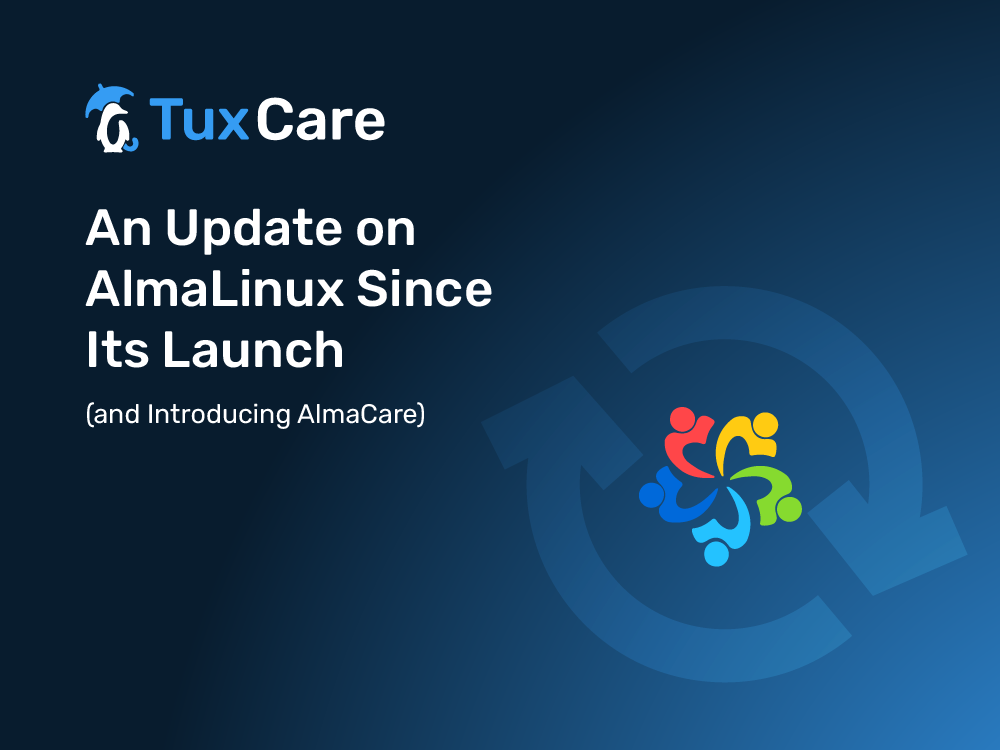An Update on AlmaLinux Since Its Launch (and Introducing AlmaCare)
TuxCare was there with you right at the start of the CentOS crisis, just as Red Hat suddenly pulled the rug from one of the most commonly used enterprise Linux alternatives. We rolled out Extended Lifecycle Support for CentOS – but also acknowledged that CentOS as we knew it is now gone.
Given the size of the CentOS user base, it’s no surprise that alternatives quickly emerged – including AlmaLinux, a non-profit supported by our parent company, CloudLinux. AlmaLinux is a forever-free, community-driven distro that can easily replace CentOS as a go-to enterprise option for all the organizations out there who were scrambling to find a new option.
Naturally, we were there at the start of AlmaLinux too. In fact, the TuxCare team has been directly involved since day one of the AlmaLinux journey. So, what’s happened with AlmaLinux since its launch? Read on to find out (…and to learn about our new enterprise-grade support for AlmaLinux, AlmaCare).
The Community Desperately Needed a CentOS Replacement
CentOS was a 1:1 fork of Red Hat Enterprise Linux (RHEL). In 2014, Red Hat officially took over the sponsorship of CentOS and gained control of the project’s intellectual assets and governing board. Red Hat invested significantly in the project, providing fixed release schedules and dependable support windows, all with the promise of 10-year maintenance support.
CentOS was a popular choice for enterprises because it was a free and 1:1 binary compatible alternative to RHEL, which included ongoing support for critical security patches. E.g., when CentOS 8 was released in September 2019 it was set to be supported for many years, offering a long window for enterprises to test it and migrate.
The big blow came in December 2020, when Red Hat announced a shift in direction for CentOS, announcing it would stop regular, stable releases that match RHEL 1:1. The decision also significantly shortened the support window for CentOS 8.
Enterprise users relying on CentOS 8 needed to rapidly switch to an alternative. RHEL was one option, but it was expensive. In Dec 2021, the free options were not simple switchovers, either because Ubuntu isn’t 1:1 binary compatible with CentOS – and there were fears that Oracle Linux could go the way of CentOS.
At that time, the Linux community acted – and two prominent alternatives emerged: AlmaLinux and Rocky Linux.
Two Years and Counting!
AlmaLinux officially launched in January 2021 as CloudLinux and community members rapidly responded to the demise of CentOS.
To ensure its independence and to avoid a situation similar to CentOS evolving, in which the crown jewels end up in the hands of a corporate giant, AlmaLinux set up as a 501(c)(6) non-profit organization called the AlmaLinux Foundation.
The aim was to ensure that AlmaLinux is run by an organization of its own standing – and to ensure that the intellectual property and the direction of the company stayed in the hands of the community.
Either way, the AlmaLinux team worked hard to deliver a Beta version of AlmaLinux and, in March 2021, the first stable release of AlmaLinux was made public. AlmaLinux has rapidly followed up with release after release to remain in lockstep with the latest releases of RHEL.
How Did CentOS Users Receive AlmaLinux?
Positively! There was rapid take-up right away, with community members quickly stepping in to try out the Beta release. Within just a few months, pulls on Docker of the official AlmaLinux image added up to over 50,000 pulls.
Wider support by some of the tech industry’s biggest giants quickly followed as Microsoft announced in August 2021 that it was rolling out support for AlmaLinux on its Azure cloud platform. Coverage of AlmaLinux spread across the mainstream tech news media, with TechRepublic offering a full – and positive – review of AlmaLinux in an October 2021 piece.
But who is using AlmaLinux? Well, as we say, the adoption of AlmaLinux was rapid and organizations of all sizes quickly saw the potential of AlmaLinux to replace CentOS. For example, by mid-2022, AlmaLinux was the operating system in use by four of the top 500 supercomputers in the world.
One of the clearest moments of the degree to which the AlmaLinux team achieved their intended goal was when it was announced that research giants CERN and Fermilab decided to adopt AlmaLinux as the standard distribution for experiments at their facilities.
What About the Other Alternatives to CentOS?
Depending on the workload in question and the resources available to an organization, there are several alternatives to CentOS over and above AlmaLinux. As an alternative, AlmaLinux functions as a drop-in, like-for-like replacement to CentOS.
One of the CentOS founders, Gregory Kurtzer, set up another CentOS replacement intended to act as a drop-in, 1:1 binary compatible alternative. Kurtzer called it Rocky Linux as a tribute to CentOS co-founder Rocky McGaugh. The code repository of Rocky Linux quickly became the top-trending option on GitHub.
The Rocky Linux team published a stable release on June 21, 2021, under the code name “Green Obsidian,” with releases since then, including an RHEL 9 compatible release.
Oracle Linux is, of course, another option – with Oracle Linux 9 released in the middle of 2022. But, in terms of new drop-in alternatives to CentOS, that’s about it – because RHEL is, after all, not free.
Some organizations opted for something different altogether – jumping across to Ubuntu, for example, which is understandable given how established Canonical is – and given the enterprise-grade support available for Ubuntu.
But, what makes AlmaLinux stand out among the few CentOS alternatives is its affordable, flexible commercial support option, AlmaCare, which was developed by the team who has been involved in AlmaLinux since day one.
Enterprise-Grade Support for AlmaLinux
After AlmaLinux launched, its innovative and loyal community began calling for an affordable commercial support service – and TuxCare answered the call with AlmaCare. AlmaCare, which just launched, is a comprehensive enterprise-grade support package delivering up to 16 years of support for AlmaLinux releases.
Now, you can maximize the potential of your AlmaLinux systems thanks to AlmaCare support from TuxCare, a division of CloudLinux Inc. – the mastermind behind the AlmaLinux OS project. With AlmaCare, you can reduce risk, maintain compliance, and more easily guarantee business stability with optional live patching (which doesn’t require reboots or downtime).
Plus, with AlmaCare, you only pay for the support you need, with optional 5, 10, or 20-hour support bundles – helping you avoid paying costly upfront support package fees that other vendors offer Enjoy top-notch support coverage and harness the stability and reliability of the community-driven AlmaLinux distribution for the long term.
A New, Free Enterprise-Grade Linux OS – Now with Enterprise-Grade Support
AlmaLinux progressed rapidly in its role as a CentOS alternative and is now a de facto replacement for anyone still running a CentOS workload. At the same time, AlmaLinux is also a great enterprise Linux OS – and it’s forever free to use.
With TuxCare’s new AlmaCare support solution now also available, enterprise users can now rely on AlmaLinux as a binary-compatible RHEL replacement. You can read more about the AlmaCare launch here, or head over to the



 Documentation
Documentation Login
Login



